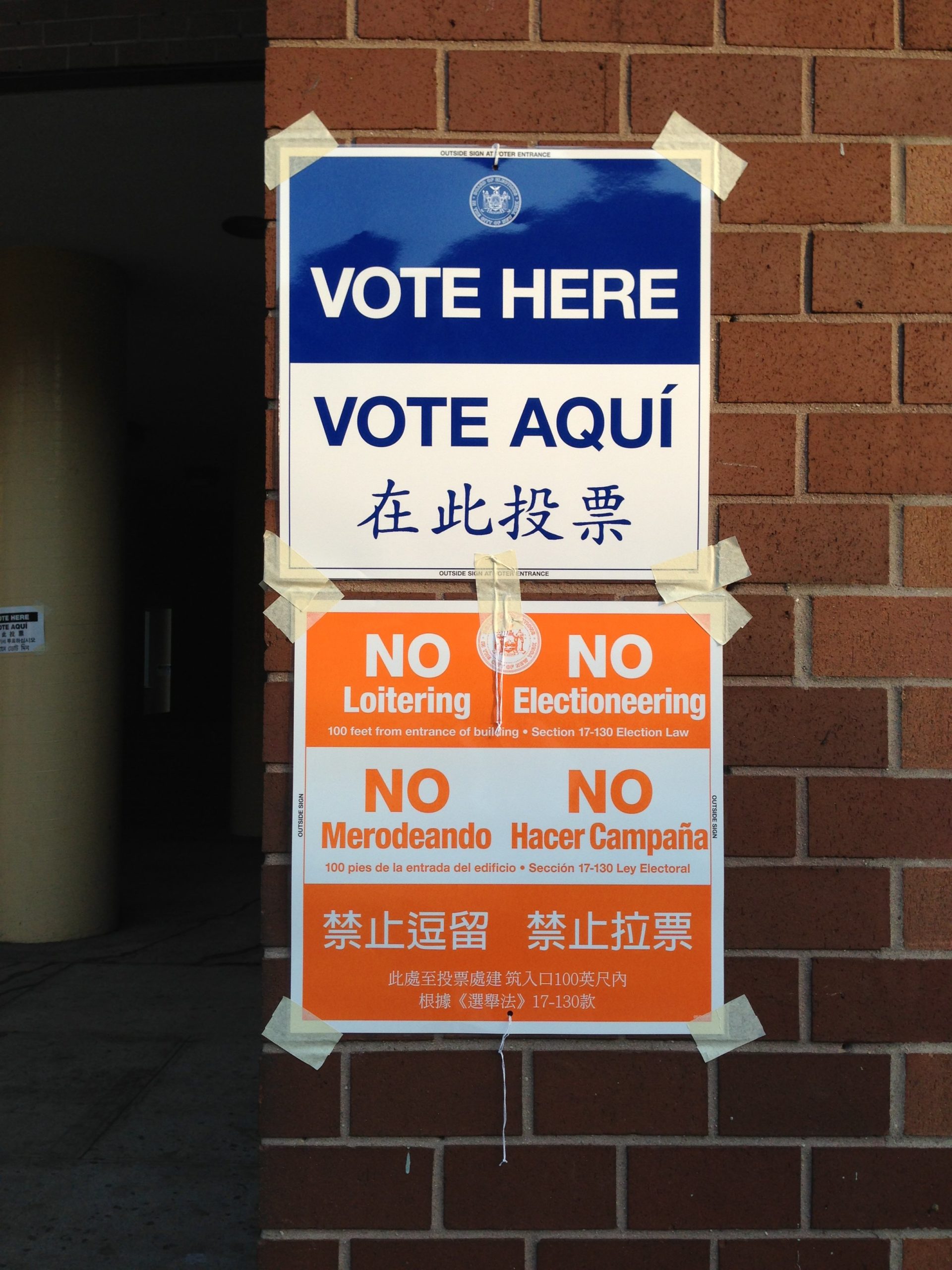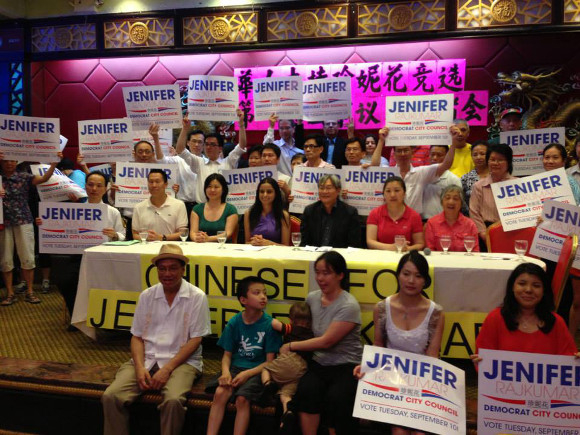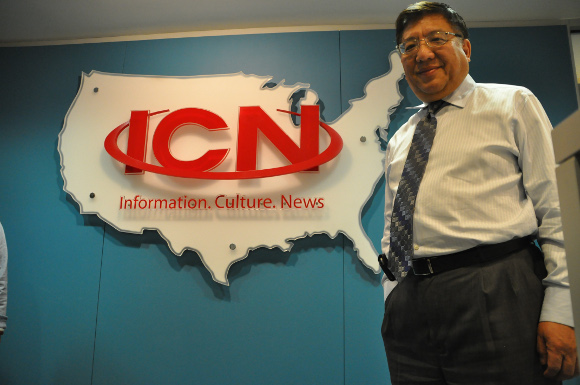“Once we printed Chinese upside-down and nobody knew it. That was embarrassing!”

November 5, 2013
When New Yorkers go to the polls today, many will find their ballots in English, Spanish, Chinese (as of 1993), Korean (as of 2001), and, as of last September’s primaries, Bengali. The way here has been bumpy and paved with delays and lawsuits. Just last month, the New York City Board of Elections was criticized for the hard-to-read, 6-point font that voters will see on ballots today – something the board claims was necessary to accommodate the number of languages.
Meanwhile, candidates have done their own linguistic preparations ahead of election day, and the path for them has been no less smooth. Anthony Weiner did himself no favors within the Latino community by choosing “Carlos Danger” as his sexting pseudonym. But then, a few weeks later he dug himself farther in the hole by releasing a much-mocked TV ad in which he spoke barely comprehensible Spanish. Translated, the opening sentence sounded something like, “Some people want this campaign was the my past, but elections are always of the future,” according to Voices of NY. Even the subtitles on the screen were wrong. A few weeks after that, he appeared in the West Indian Day parade in Brooklyn, shouting from atop a float in a faux-Jamaican accent.
Since Wiener’s wiener first hit the internet in 2011 he has become something of a walking punch line, an easy political gag in New York politics, but plenty of other politicians have made their own foreign language related gaffes. Michael Bloomberg’s penchant for making press announcements in monotone Spanish have inspired a Twitter account with 78,000+ followers with the handle @ElBloombito. And some of our national-level politicians get criticized for speaking a foreign language at all – the French-speaking John Kerry has been derided as a Francophile, while some found Jon Huntsman’s Chinese skills obnoxious. Barack Obama knows some Indonesian, but given the constant attacks on his background, that isn’t exactly an advantage for him.
Just last month, the New York City Board of Elections was criticized for the hard-to-read, 6-point font that voters will see on ballots today – something the board claims was necessary to accommodate the many languages that must appear on the ballot.
Politics is already a minefield for missteps. Campaigning through a language barrier, as often happens in a city as diverse as New York, only increases the potential for mistakes. In New York City, 180 languages are spoken and more than 1.8 million residents identified as limited English pro?cient (LEP). The city government is well aware of the challenges involved. So what’s a well-meaning, ethnic-vote-hungry politician to do? Yes, the opportunities for misunderstanding are great, but if the choice is between sounding silly or not reaching voters at all, sound silly you must.

Eric Spencer, a former campaign manager for US Representative Carolyn Maloney, who also volunteered for Eric T. Schneiderman’s New York Attorney General run in 2010, recalls that during Schneiderman’s primary campaigning, he was randomly handed a list of numbers to call in Confucius Plaza, a housing project in Chinatown. Spencer quickly found that many people picking up the phone didn’t speak English. As it happened, he had lived in Beijing for many years and knew some Chinese. “I winged it based on what little Chinese I knew,” said Spencer. But, he later asked the campaign for a script in pinyin (Romanized Chinese) to use on calls going forward. The campaign did so, and for the general election, drew up scripts in multiple languages, which proved helpful for other volunteers. Schneiderman knows a smattering of Mandarin from having lived briefly in Hong Kong, and also was redistricted at one point into a 50% Spanish-speaking area, which prompted him to study Spanish too. “So I think [he and his campaign] were maybe more attuned to foreign languages than most,” said Spencer.
Based on Schneiderman’s winning example, at least, it seems that the first step in pulling off graceful foreign-language appeals to LEP voters is understanding the landscape of your constituents. From there, candidates seeking to reach LEP voters face a few common challenges, including the extra expense. Ron Kim, a New York State Assemblyman from Queens, pointed out that translating campaign literature means using a lot of freelance workers and that takes money. Since LEP voters often don’t turn out to vote as much, this means candidates have to raise a lot more money for a comparatively lower number of voters. Of his own run in 2012, Kim recalls that “even though it was a race that only had a few thousand voters that came out in the primary, an average candidate in that race had to raise over 150,000 dollars to be competitive.”
Beyond money, there’s also the challenge associated with finding those voters. Jerry Skurnik runs Prime New York, a data firm that provides mailing lists of “prime” voters (for example New Yorkers of Russian descent who’ve voted three times) to campaigns. But, he says, these lists are based on last names, making them an inexact science. “Whoopi Goldberg would be on the Jewish list,” says Skurnik. “And Spike Lee would appear as a Korean or Chinese name. So none of these things are 100% accurate, but they’re the best you can do.” (Skurnik himself has received mailings from Verizon in Russian, which he doesn’t speak.)
The Written Word
Those print materials that would-be LEP voters receive can be tricky to produce. For one, much of the time, neither the vendor nor the campaign liaison knows the actual language in question. “I might be making obscene buttons and don’t even know it,” said Robert Slater, head of NG Button Corp, which makes buttons for political campaigns in a variety of languages (for example, “Vote for Obama” in Hebrew). That means a lot of room for error. “We are very careful in sending proofs so that someone signs off on it, but unfortunately, the campaign does make mistakes,” he added. More than a few times, Slater said, the campaign got as far as distributing the buttons, and had to find out from constituents that they were wrong (though he declined to name any specific examples).
Al Handell, who’s produced the printing for the vast majority of New York’s democratic campaigns over the past 44 years, had similar tales to tell. “Once we printed Chinese upside-down and nobody knew it. That was embarrassing!” He said it took three days before someone came back to him about the mistake, a fact he found “just remarkable.”
“I might be making obscene buttons and don’t even know it,” said Robert Slater, head of NG Button Corp.
Then, there’s the problem of names. With some languages, it makes sense to simply offset the candidate’s name in English alongside the foreign words (as in the case of “Vote for Obama” in Hebrew). If a language is very different from English, but has an alphabet, they can keep the English name but write it according to their alphabet. The Bengali newsweekly Bangla Patrika does this.
But consider Chinese, which lacks an alphabet. Joe Wei, the managing editor of the World Journal, the largest Chinese-language paper in the US, said at a CUNY J-School conference in September that his paper gives all the candidates a Chinese name. He recommends that every candidate prepare a Chinese name to help Chinese-speaking voters remember them–and that they get them onto the ballot. (Otherwise, the Board of Elections will supply its own, potentially clunky-sounding Chinese transliteration for them.) He cited Jenifer Rajkumar, who ran in the primaries this year in a district which includes Chinatown (she lost to incumbent Margaret Chin), as a good example of someone who had prepared a Chinese name and included it on all her campaign materials. “Though actually,” he mused, “I don’t think her Chinese name sounds very good.” (He didn’t elaborate on why.)
In a recent interview, Jenifer Rajkumar explained that her Chinese volunteers helped her come up with her Chinese name, Zhen Nihua. It’s based on the sound of her first name, and was chosen because it would be easy for voters to remember. “Even in English I went by Jenifer mostly; my last name was not emphasized on campaign signs,” she said.
Ron Kim, the Assemblyman, also has a Chinese name that he was given early on. “We had many meetings about it,” he said. But, “It means ‘shining gold’ or something, I don’t know. And my wife [who is Chinese-American] was like, ‘You know that sounds like a friggin’ restaurant. You’re going to make people hungry.’” He was convinced to instead use a direct translation from his Korean name, which doesn’t make sense in meaning, but would obviously read as a Korean name to Chinese speakers, and is unique enough to remember. “So many of my Chinese seniors and constituents know me as Jin Duixi, which means gold against tin.” (He has a Korean name too, but didn’t use it in his campaign.)

The Spoken Word
Armed with her Chinese name, Jenifer Rajkumar did a great deal of knocking on doors alongside a volunteer translator, talking to seniors in Chinatown. The realm of spoken translation, of course, can also be tricky – and involves a great deal of trust in one’s translators.
Rajkumar recalls that there were some challenges in the translation. “I know it only because after an event my Chinese volunteers would be talking, about for example, ‘civil rights lawyer’ [Rajkumar’s profession], ‘social justice’ – how to translate those concepts.” But, she adds, “the good thing was that I got to give so many speeches and interviews that the Chinese translators got used to translating my platform. So my sense is it got better and better.”
At a certain point, one of her favorite volunteers, a 17-year-old named Jun, got so good that he started taking her message into his own hands. Rajkumar recalled that sometimes, after delivering the campaign message, the resident would have questions that they’d ask in Chinese. “Then I would be standing there thinking, ‘What’s he saying, what’s he saying?’ But Jun would ignore me and continue the conversation.” She feels this was a good thing – after all, the residents only had so much time to offer, and it would hold up the conversation if she kept cutting in to ask for a translation. And above all, she said, “Everyone believed in the campaign so much and spent so much of their time on it that we were all on the same page. So I felt very comfortable and was very confident in the quality of their conversation.”
Jenifer Rajkumar hired a truck to park on Bowery Street in Chinatown and broadcast her message in English, Mandarin, and Cantonese on the day of the primaries
Another thing Rajkumar did was drop bits of Chinese, Spanish, and Yiddish into her speeches, including her campaign announcement speech on the steps of City Hall. Candidates adopting this tactic run the risk of veering into “Miguel Bloombito” territory. But, Rajkumar says that this helped with TV coverage. Sinovision, the Chinese-language station, recorded the two sentences she said in Chinese and aired the clip several times.
Kim also incorporates bits of Chinese and Korean into his talks at community events. Though, he laments, “I’m really bad with the tones. So my pronunciation is not that great.”
And, most LEP listeners seem to appreciate it. Kim also incorporates bits of Chinese and Korean into his talks at community events. Though, he laments, “I’m really bad with the tones. So my pronunciation is not that great. But it does resonate. It may not be perfect but if you go out there and at least open up and close with some phrases, the crowd really appreciates that you’re making the effort.”
Abu Taher, the editor of Bangla Patrika, a nationally distributed Bengali newspaper, said that pretty much all of this year’s mayoral primary candidates regularly use Bengali when they speak at community events in Bangladeshi neighborhoods. Common phrases include: asalaam walaykum (“peace be with you”), khoda hafiz (“goodbye”), and Ami Bangladeshi community kay bhalo bashi (“I love the Bangladeshi community”), recalled Abu. “This kind of language makes the candidates closer to the community. The community feels like, oh definitely he cares about our community, he knows our language.”
Steve Kramer, a political consultant and robocall specialist who runs a company called Get Out the Vote, would agree that it’s all about the local community. He explained that in his work, using native speakers to record non-English calls is “critical.” But, that doesn’t just mean being a native speaker in general, but also a native speaker from the same area as the people answering the phone.
“If you have someone who doesn’t speak Korean in a way that it’s spoken on the East Coast, but maybe is more West Coast, it’s going to translate something in a different way,” Kramer said. Or, “we’ll get a request for Cantonese, but it might be for Boston rather than let’s say San Francisco. You’ll want someone who’s got a Boston Cantonese accent, whatever that is.”
Someone with that local voice, he said, will speak with the right expressions, phrasing, and other subtleties that go beyond just the language itself. “In the same way you wouldn’t have Denis Leary doing a New York City ad, because he’s got a Boston accent, or have Giuliani cut something for Texas. The same is true with the different language – dialects I guess, so that it matches the areas that you’re from or live in. Because you can tell those accents, especially when you’re on the phone.”
Formal versus casual tones are also important, he explained. “Imagine if someone gave you a call and said, “Hey there! How are you!” [in upbeat, casual tone] instead of saying, “Hi, I’d like to speak with…” [in more formal tone]. There’s a big difference in the way you approach things, especially in the beginning of the message, because in the first seven seconds you either get their attention and they stay on the line, or they don’t. There is no in between.”
Kramer said that the content of the message can determine the language used. Sometimes, campaigns will send out messages in two different languages. A household might get a call in English one night, then one in Spanish the next. Sometimes the message is the same, but sometimes, it has a different theme. In those cases, “Something that’s talking about immigration rights, you want to say it in Spanish. But if you’re talking about the bodega on the corner that’s causing big problems for everybody, maybe you say that in English. There’s different ways to use the language you choose to get people to stay on a little bit longer.” The Bloomberg campaign in 2005, he said, had “something like 58 categories of different ethnicities within NYC alone,” towards which they targeted differing, individualized mailings and phone messages. “And it’s grown a lot more since then.”
Focusing on the Issues
At the end of the day, all this parsing of language and accent and ethnicity is irrelevant if a candidate has no worthwhile message to deliver. Khalilur Rehman, editor of Pakistani-language Urdu Times, dismissed any line of questioning about the importance of language outreach. “The language is not a problem because we translate everything we receive into Urdu,” he said. The real issue, in his opinion, is that “most of the time, whatever information we receive is 90% irrelevant to my readers.”
He added, “The main thing our community or any community wants to listen to from the candidates is that they know the issues, they know what the community wants, and what kinds of problems they are facing… we have a feeling that all the candidates, they’re looking for a vote but don’t want to touch our issues.”
In other words, if Anthony Weiner had actually seemed like he cared about issues facing Spanish-speaking communities, his language gaffes might not have mattered. And in the end, a landscape in which Michael Bloomberg, upon starting his first campaign for mayor, decided to start taking Spanish lessons, or in which Carlos Menchaca, the city’s first Mexican-American councilman (for south Brooklyn) plans to study Chinese (“My favorite word is ‘zhu rou’…because I love pork”), is preferable to one in which politicians are indifferent to other languages and cultures.

Jenifer Rajkumar, for one, urged candidates not to mind the gaffe. “I would say to candidates, don’t be afraid to go anywhere. Don’t be afraid to go into an area where everyone speaks a different language. Just boldly go there and you’ll find that your campaign message resonates.”
Ron Kim agreed. “I think all politicians inevitably will make some gaffes along the way in dealing with different cultures and communities,” he said. “But end of the day, as long as you are making a genuine effort to connect, people will appreciate it.”



